Legislation and Ethics in Travel and Tourism
VerifiedAdded on 2020/02/05
|9
|2733
|79
Report
AI Summary
This report delves into the legal and ethical frameworks governing the travel and tourism sector. It covers various aspects such as health, safety, and security legislation, equality laws, consumer protection, and the ethical dilemmas faced by the industry. The report also discusses the importance of corporate social responsibility (CSR) in promoting sustainable tourism practices. Through a comprehensive analysis, it highlights the significance of adhering to legal standards and ethical considerations to ensure the safety and satisfaction of travelers.
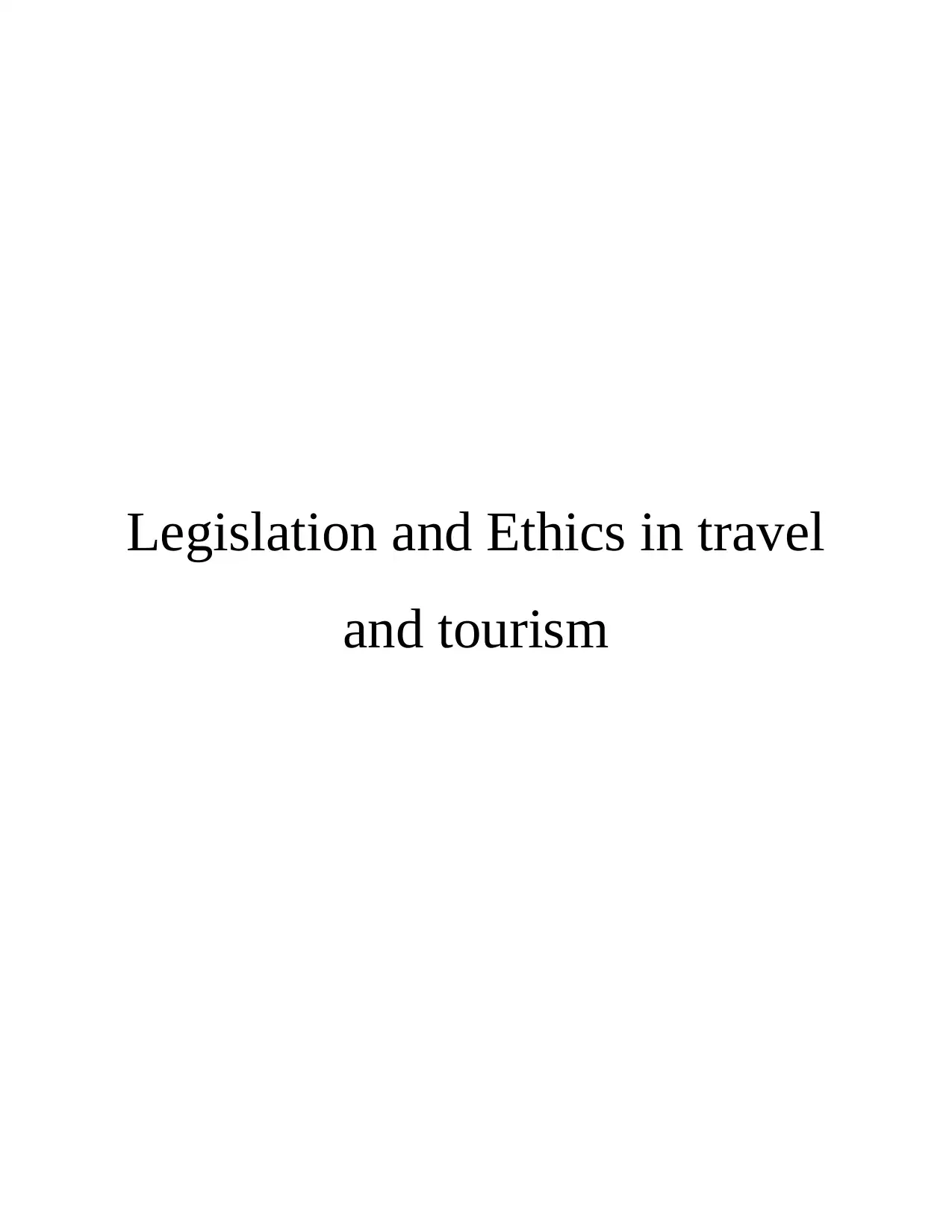
Legislation and Ethics in travel
and tourism
and tourism
Paraphrase This Document
Need a fresh take? Get an instant paraphrase of this document with our AI Paraphraser
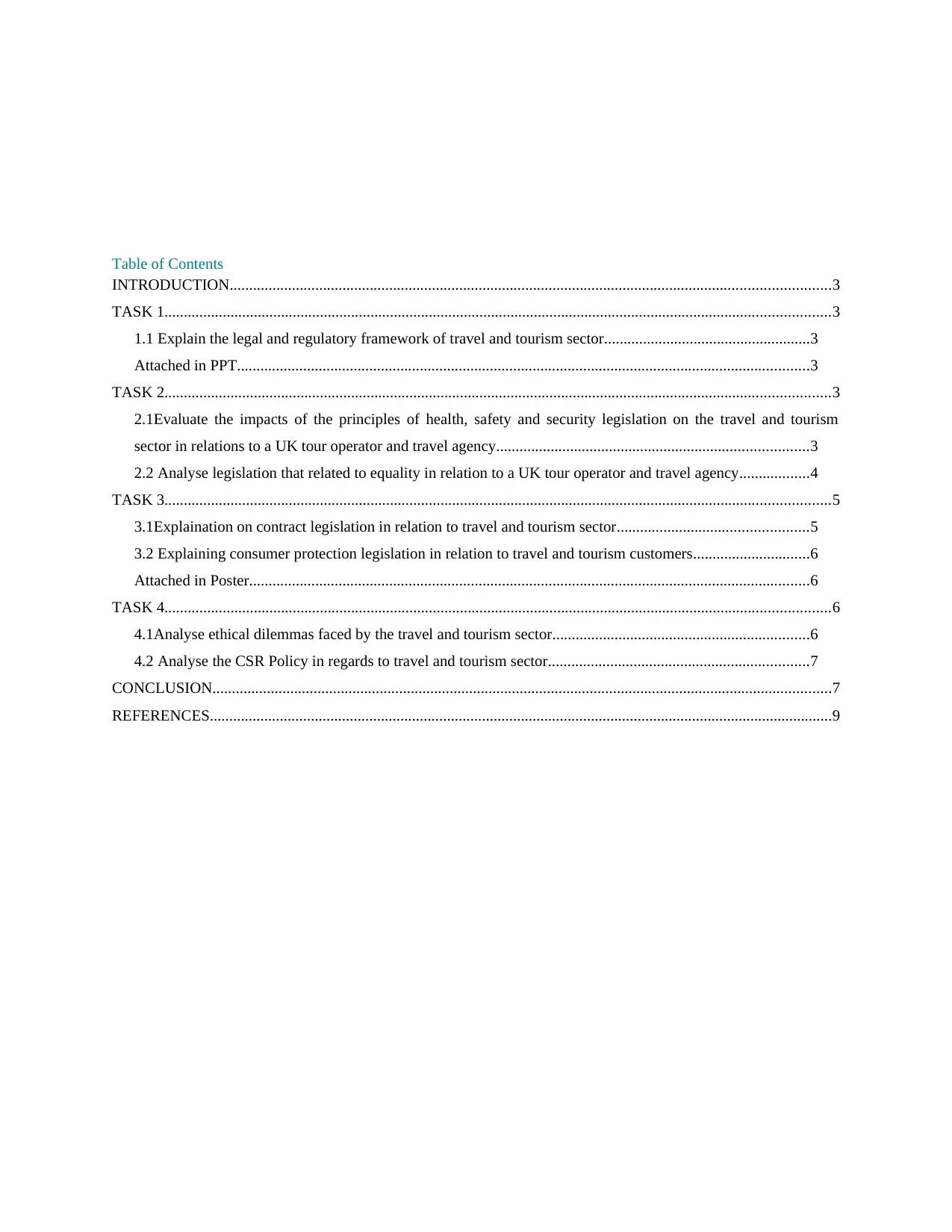
Table of Contents
INTRODUCTION..........................................................................................................................................................3
TASK 1...........................................................................................................................................................................3
1.1 Explain the legal and regulatory framework of travel and tourism sector.....................................................3
Attached in PPT...................................................................................................................................................3
TASK 2...........................................................................................................................................................................3
2.1Evaluate the impacts of the principles of health, safety and security legislation on the travel and tourism
sector in relations to a UK tour operator and travel agency................................................................................3
2.2 Analyse legislation that related to equality in relation to a UK tour operator and travel agency..................4
TASK 3...........................................................................................................................................................................5
3.1Explaination on contract legislation in relation to travel and tourism sector.................................................5
3.2 Explaining consumer protection legislation in relation to travel and tourism customers..............................6
Attached in Poster................................................................................................................................................6
TASK 4...........................................................................................................................................................................6
4.1Analyse ethical dilemmas faced by the travel and tourism sector..................................................................6
4.2 Analyse the CSR Policy in regards to travel and tourism sector...................................................................7
CONCLUSION...............................................................................................................................................................7
REFERENCES................................................................................................................................................................9
INTRODUCTION..........................................................................................................................................................3
TASK 1...........................................................................................................................................................................3
1.1 Explain the legal and regulatory framework of travel and tourism sector.....................................................3
Attached in PPT...................................................................................................................................................3
TASK 2...........................................................................................................................................................................3
2.1Evaluate the impacts of the principles of health, safety and security legislation on the travel and tourism
sector in relations to a UK tour operator and travel agency................................................................................3
2.2 Analyse legislation that related to equality in relation to a UK tour operator and travel agency..................4
TASK 3...........................................................................................................................................................................5
3.1Explaination on contract legislation in relation to travel and tourism sector.................................................5
3.2 Explaining consumer protection legislation in relation to travel and tourism customers..............................6
Attached in Poster................................................................................................................................................6
TASK 4...........................................................................................................................................................................6
4.1Analyse ethical dilemmas faced by the travel and tourism sector..................................................................6
4.2 Analyse the CSR Policy in regards to travel and tourism sector...................................................................7
CONCLUSION...............................................................................................................................................................7
REFERENCES................................................................................................................................................................9
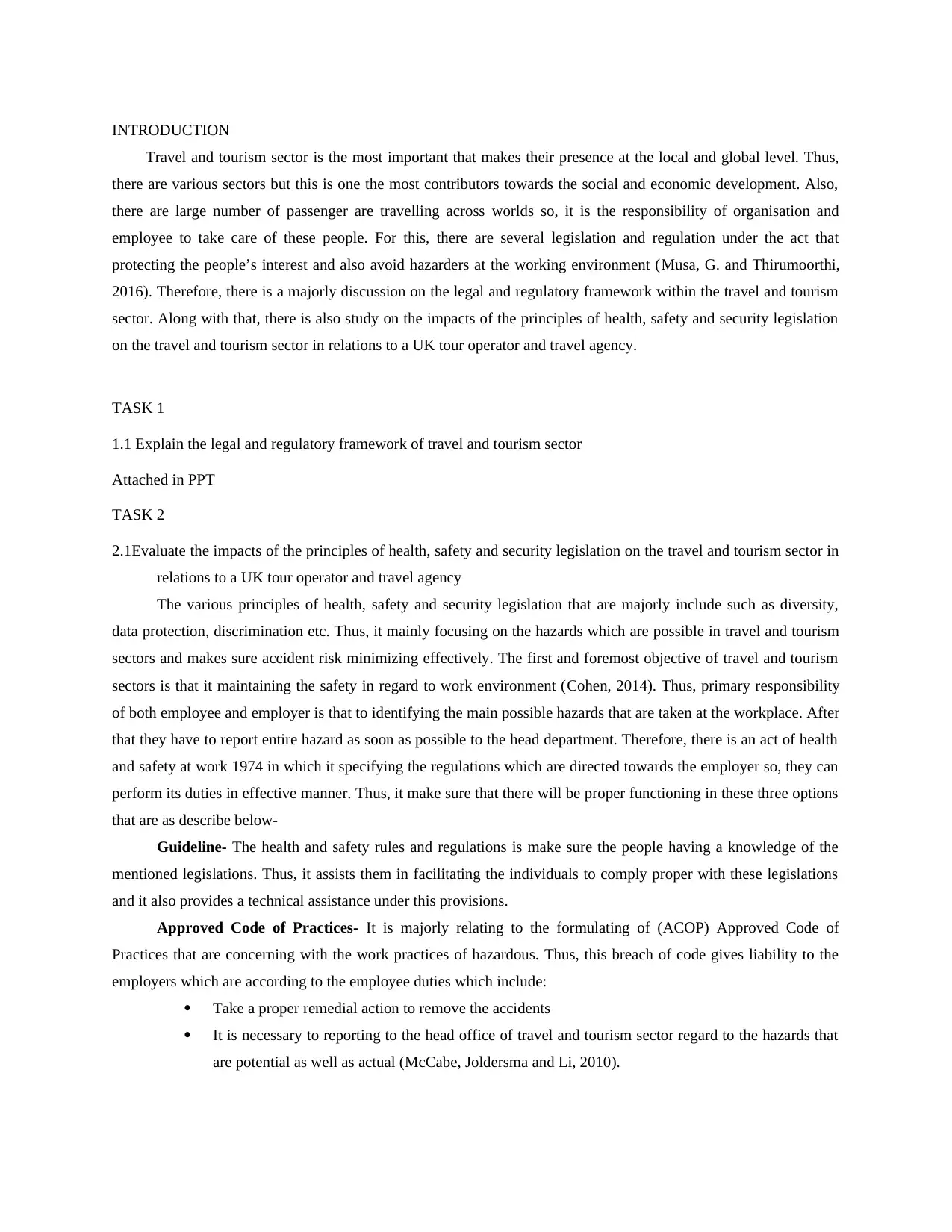
INTRODUCTION
Travel and tourism sector is the most important that makes their presence at the local and global level. Thus,
there are various sectors but this is one the most contributors towards the social and economic development. Also,
there are large number of passenger are travelling across worlds so, it is the responsibility of organisation and
employee to take care of these people. For this, there are several legislation and regulation under the act that
protecting the people’s interest and also avoid hazarders at the working environment (Musa, G. and Thirumoorthi,
2016). Therefore, there is a majorly discussion on the legal and regulatory framework within the travel and tourism
sector. Along with that, there is also study on the impacts of the principles of health, safety and security legislation
on the travel and tourism sector in relations to a UK tour operator and travel agency.
TASK 1
1.1 Explain the legal and regulatory framework of travel and tourism sector
Attached in PPT
TASK 2
2.1Evaluate the impacts of the principles of health, safety and security legislation on the travel and tourism sector in
relations to a UK tour operator and travel agency
The various principles of health, safety and security legislation that are majorly include such as diversity,
data protection, discrimination etc. Thus, it mainly focusing on the hazards which are possible in travel and tourism
sectors and makes sure accident risk minimizing effectively. The first and foremost objective of travel and tourism
sectors is that it maintaining the safety in regard to work environment (Cohen, 2014). Thus, primary responsibility
of both employee and employer is that to identifying the main possible hazards that are taken at the workplace. After
that they have to report entire hazard as soon as possible to the head department. Therefore, there is an act of health
and safety at work 1974 in which it specifying the regulations which are directed towards the employer so, they can
perform its duties in effective manner. Thus, it make sure that there will be proper functioning in these three options
that are as describe below-
Guideline- The health and safety rules and regulations is make sure the people having a knowledge of the
mentioned legislations. Thus, it assists them in facilitating the individuals to comply proper with these legislations
and it also provides a technical assistance under this provisions.
Approved Code of Practices- It is majorly relating to the formulating of (ACOP) Approved Code of
Practices that are concerning with the work practices of hazardous. Thus, this breach of code gives liability to the
employers which are according to the employee duties which include:
Take a proper remedial action to remove the accidents
It is necessary to reporting to the head office of travel and tourism sector regard to the hazards that
are potential as well as actual (McCabe, Joldersma and Li, 2010).
Travel and tourism sector is the most important that makes their presence at the local and global level. Thus,
there are various sectors but this is one the most contributors towards the social and economic development. Also,
there are large number of passenger are travelling across worlds so, it is the responsibility of organisation and
employee to take care of these people. For this, there are several legislation and regulation under the act that
protecting the people’s interest and also avoid hazarders at the working environment (Musa, G. and Thirumoorthi,
2016). Therefore, there is a majorly discussion on the legal and regulatory framework within the travel and tourism
sector. Along with that, there is also study on the impacts of the principles of health, safety and security legislation
on the travel and tourism sector in relations to a UK tour operator and travel agency.
TASK 1
1.1 Explain the legal and regulatory framework of travel and tourism sector
Attached in PPT
TASK 2
2.1Evaluate the impacts of the principles of health, safety and security legislation on the travel and tourism sector in
relations to a UK tour operator and travel agency
The various principles of health, safety and security legislation that are majorly include such as diversity,
data protection, discrimination etc. Thus, it mainly focusing on the hazards which are possible in travel and tourism
sectors and makes sure accident risk minimizing effectively. The first and foremost objective of travel and tourism
sectors is that it maintaining the safety in regard to work environment (Cohen, 2014). Thus, primary responsibility
of both employee and employer is that to identifying the main possible hazards that are taken at the workplace. After
that they have to report entire hazard as soon as possible to the head department. Therefore, there is an act of health
and safety at work 1974 in which it specifying the regulations which are directed towards the employer so, they can
perform its duties in effective manner. Thus, it make sure that there will be proper functioning in these three options
that are as describe below-
Guideline- The health and safety rules and regulations is make sure the people having a knowledge of the
mentioned legislations. Thus, it assists them in facilitating the individuals to comply proper with these legislations
and it also provides a technical assistance under this provisions.
Approved Code of Practices- It is majorly relating to the formulating of (ACOP) Approved Code of
Practices that are concerning with the work practices of hazardous. Thus, this breach of code gives liability to the
employers which are according to the employee duties which include:
Take a proper remedial action to remove the accidents
It is necessary to reporting to the head office of travel and tourism sector regard to the hazards that
are potential as well as actual (McCabe, Joldersma and Li, 2010).
⊘ This is a preview!⊘
Do you want full access?
Subscribe today to unlock all pages.

Trusted by 1+ million students worldwide
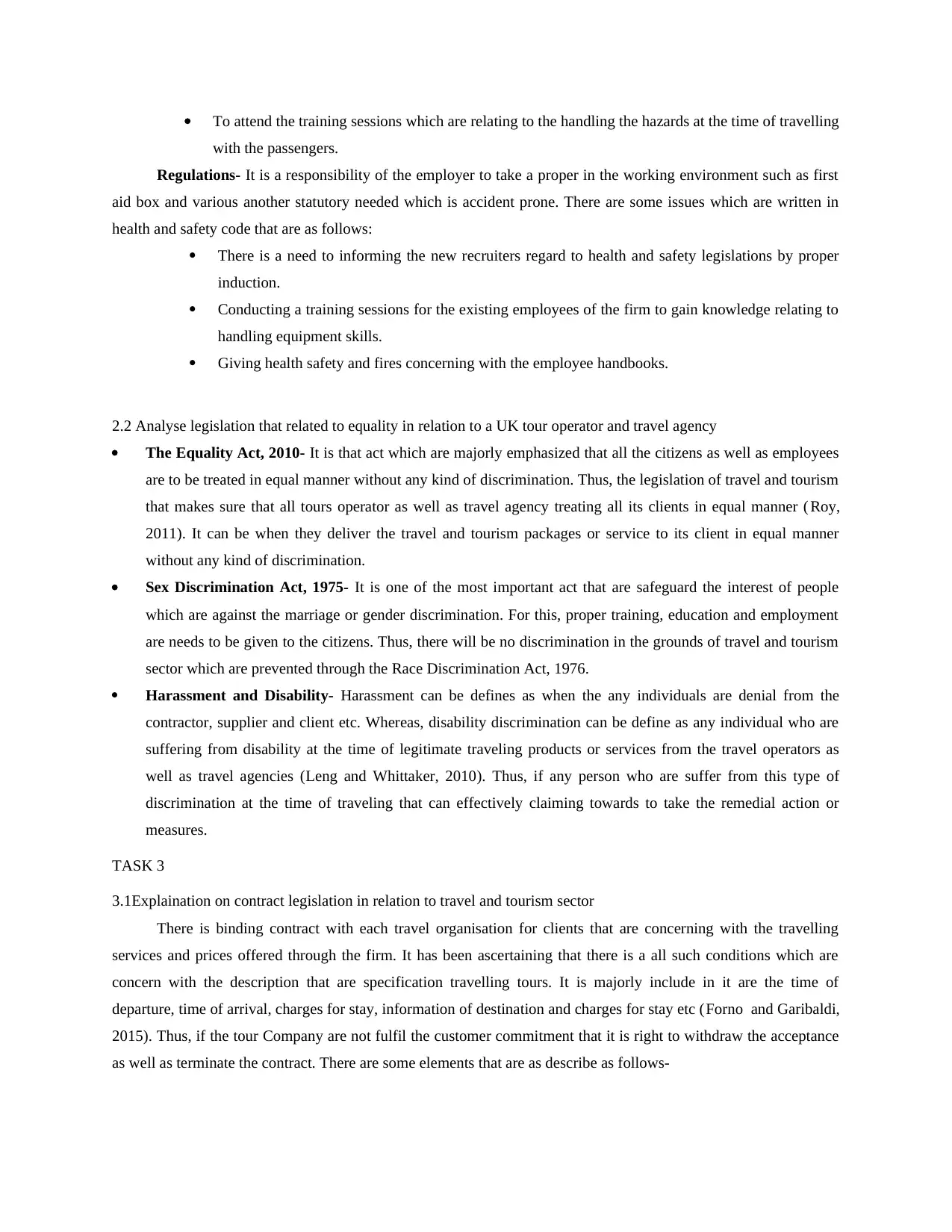
To attend the training sessions which are relating to the handling the hazards at the time of travelling
with the passengers.
Regulations- It is a responsibility of the employer to take a proper in the working environment such as first
aid box and various another statutory needed which is accident prone. There are some issues which are written in
health and safety code that are as follows:
There is a need to informing the new recruiters regard to health and safety legislations by proper
induction.
Conducting a training sessions for the existing employees of the firm to gain knowledge relating to
handling equipment skills.
Giving health safety and fires concerning with the employee handbooks.
2.2 Analyse legislation that related to equality in relation to a UK tour operator and travel agency
The Equality Act, 2010- It is that act which are majorly emphasized that all the citizens as well as employees
are to be treated in equal manner without any kind of discrimination. Thus, the legislation of travel and tourism
that makes sure that all tours operator as well as travel agency treating all its clients in equal manner ( Roy,
2011). It can be when they deliver the travel and tourism packages or service to its client in equal manner
without any kind of discrimination.
Sex Discrimination Act, 1975- It is one of the most important act that are safeguard the interest of people
which are against the marriage or gender discrimination. For this, proper training, education and employment
are needs to be given to the citizens. Thus, there will be no discrimination in the grounds of travel and tourism
sector which are prevented through the Race Discrimination Act, 1976.
Harassment and Disability- Harassment can be defines as when the any individuals are denial from the
contractor, supplier and client etc. Whereas, disability discrimination can be define as any individual who are
suffering from disability at the time of legitimate traveling products or services from the travel operators as
well as travel agencies (Leng and Whittaker, 2010). Thus, if any person who are suffer from this type of
discrimination at the time of traveling that can effectively claiming towards to take the remedial action or
measures.
TASK 3
3.1Explaination on contract legislation in relation to travel and tourism sector
There is binding contract with each travel organisation for clients that are concerning with the travelling
services and prices offered through the firm. It has been ascertaining that there is a all such conditions which are
concern with the description that are specification travelling tours. It is majorly include in it are the time of
departure, time of arrival, charges for stay, information of destination and charges for stay etc (Forno and Garibaldi,
2015). Thus, if the tour Company are not fulfil the customer commitment that it is right to withdraw the acceptance
as well as terminate the contract. There are some elements that are as describe as follows-
with the passengers.
Regulations- It is a responsibility of the employer to take a proper in the working environment such as first
aid box and various another statutory needed which is accident prone. There are some issues which are written in
health and safety code that are as follows:
There is a need to informing the new recruiters regard to health and safety legislations by proper
induction.
Conducting a training sessions for the existing employees of the firm to gain knowledge relating to
handling equipment skills.
Giving health safety and fires concerning with the employee handbooks.
2.2 Analyse legislation that related to equality in relation to a UK tour operator and travel agency
The Equality Act, 2010- It is that act which are majorly emphasized that all the citizens as well as employees
are to be treated in equal manner without any kind of discrimination. Thus, the legislation of travel and tourism
that makes sure that all tours operator as well as travel agency treating all its clients in equal manner ( Roy,
2011). It can be when they deliver the travel and tourism packages or service to its client in equal manner
without any kind of discrimination.
Sex Discrimination Act, 1975- It is one of the most important act that are safeguard the interest of people
which are against the marriage or gender discrimination. For this, proper training, education and employment
are needs to be given to the citizens. Thus, there will be no discrimination in the grounds of travel and tourism
sector which are prevented through the Race Discrimination Act, 1976.
Harassment and Disability- Harassment can be defines as when the any individuals are denial from the
contractor, supplier and client etc. Whereas, disability discrimination can be define as any individual who are
suffering from disability at the time of legitimate traveling products or services from the travel operators as
well as travel agencies (Leng and Whittaker, 2010). Thus, if any person who are suffer from this type of
discrimination at the time of traveling that can effectively claiming towards to take the remedial action or
measures.
TASK 3
3.1Explaination on contract legislation in relation to travel and tourism sector
There is binding contract with each travel organisation for clients that are concerning with the travelling
services and prices offered through the firm. It has been ascertaining that there is a all such conditions which are
concern with the description that are specification travelling tours. It is majorly include in it are the time of
departure, time of arrival, charges for stay, information of destination and charges for stay etc (Forno and Garibaldi,
2015). Thus, if the tour Company are not fulfil the customer commitment that it is right to withdraw the acceptance
as well as terminate the contract. There are some elements that are as describe as follows-
Paraphrase This Document
Need a fresh take? Get an instant paraphrase of this document with our AI Paraphraser
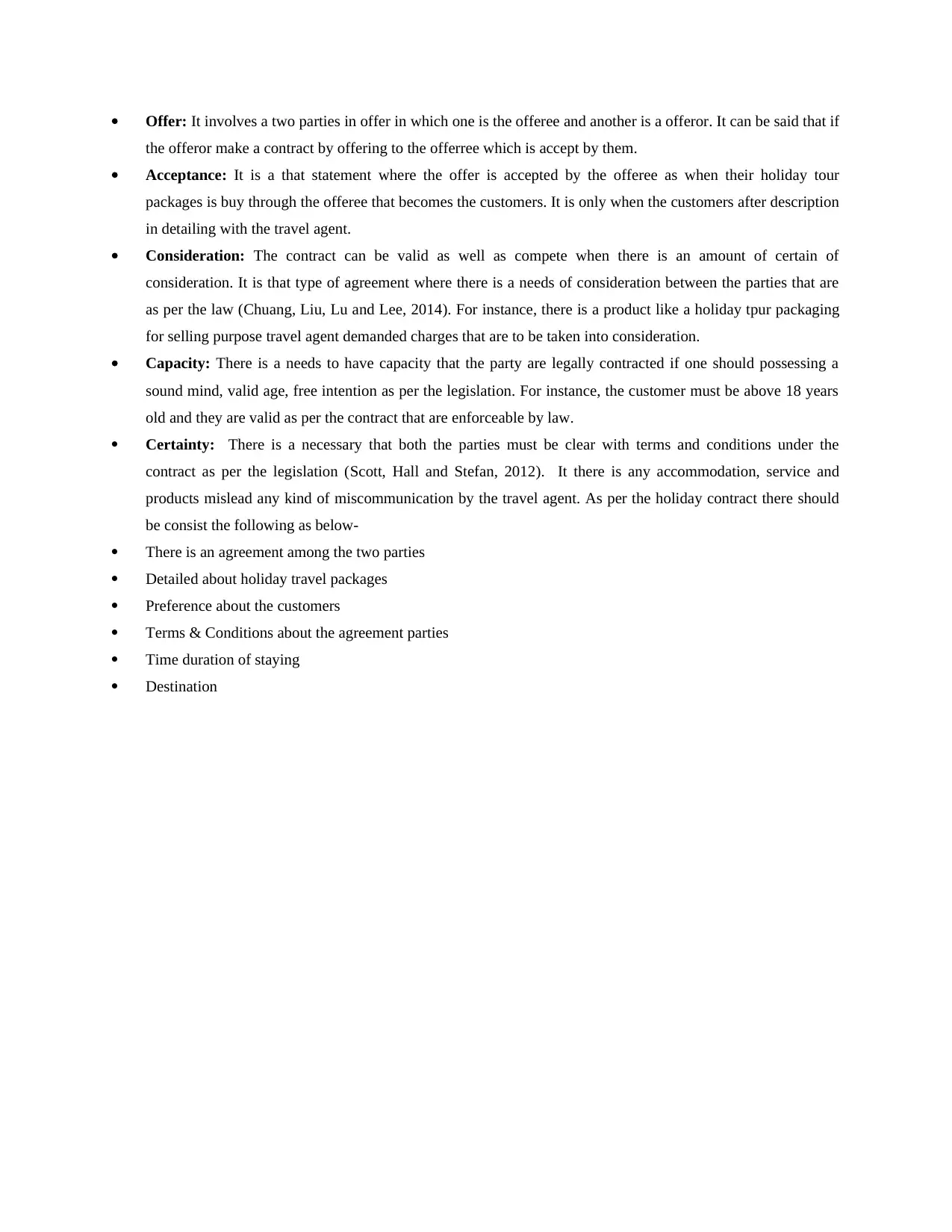
Offer: It involves a two parties in offer in which one is the offeree and another is a offeror. It can be said that if
the offeror make a contract by offering to the offerree which is accept by them.
Acceptance: It is a that statement where the offer is accepted by the offeree as when their holiday tour
packages is buy through the offeree that becomes the customers. It is only when the customers after description
in detailing with the travel agent.
Consideration: The contract can be valid as well as compete when there is an amount of certain of
consideration. It is that type of agreement where there is a needs of consideration between the parties that are
as per the law (Chuang, Liu, Lu and Lee, 2014). For instance, there is a product like a holiday tpur packaging
for selling purpose travel agent demanded charges that are to be taken into consideration.
Capacity: There is a needs to have capacity that the party are legally contracted if one should possessing a
sound mind, valid age, free intention as per the legislation. For instance, the customer must be above 18 years
old and they are valid as per the contract that are enforceable by law.
Certainty: There is a necessary that both the parties must be clear with terms and conditions under the
contract as per the legislation (Scott, Hall and Stefan, 2012). It there is any accommodation, service and
products mislead any kind of miscommunication by the travel agent. As per the holiday contract there should
be consist the following as below-
There is an agreement among the two parties
Detailed about holiday travel packages
Preference about the customers
Terms & Conditions about the agreement parties
Time duration of staying
Destination
the offeror make a contract by offering to the offerree which is accept by them.
Acceptance: It is a that statement where the offer is accepted by the offeree as when their holiday tour
packages is buy through the offeree that becomes the customers. It is only when the customers after description
in detailing with the travel agent.
Consideration: The contract can be valid as well as compete when there is an amount of certain of
consideration. It is that type of agreement where there is a needs of consideration between the parties that are
as per the law (Chuang, Liu, Lu and Lee, 2014). For instance, there is a product like a holiday tpur packaging
for selling purpose travel agent demanded charges that are to be taken into consideration.
Capacity: There is a needs to have capacity that the party are legally contracted if one should possessing a
sound mind, valid age, free intention as per the legislation. For instance, the customer must be above 18 years
old and they are valid as per the contract that are enforceable by law.
Certainty: There is a necessary that both the parties must be clear with terms and conditions under the
contract as per the legislation (Scott, Hall and Stefan, 2012). It there is any accommodation, service and
products mislead any kind of miscommunication by the travel agent. As per the holiday contract there should
be consist the following as below-
There is an agreement among the two parties
Detailed about holiday travel packages
Preference about the customers
Terms & Conditions about the agreement parties
Time duration of staying
Destination
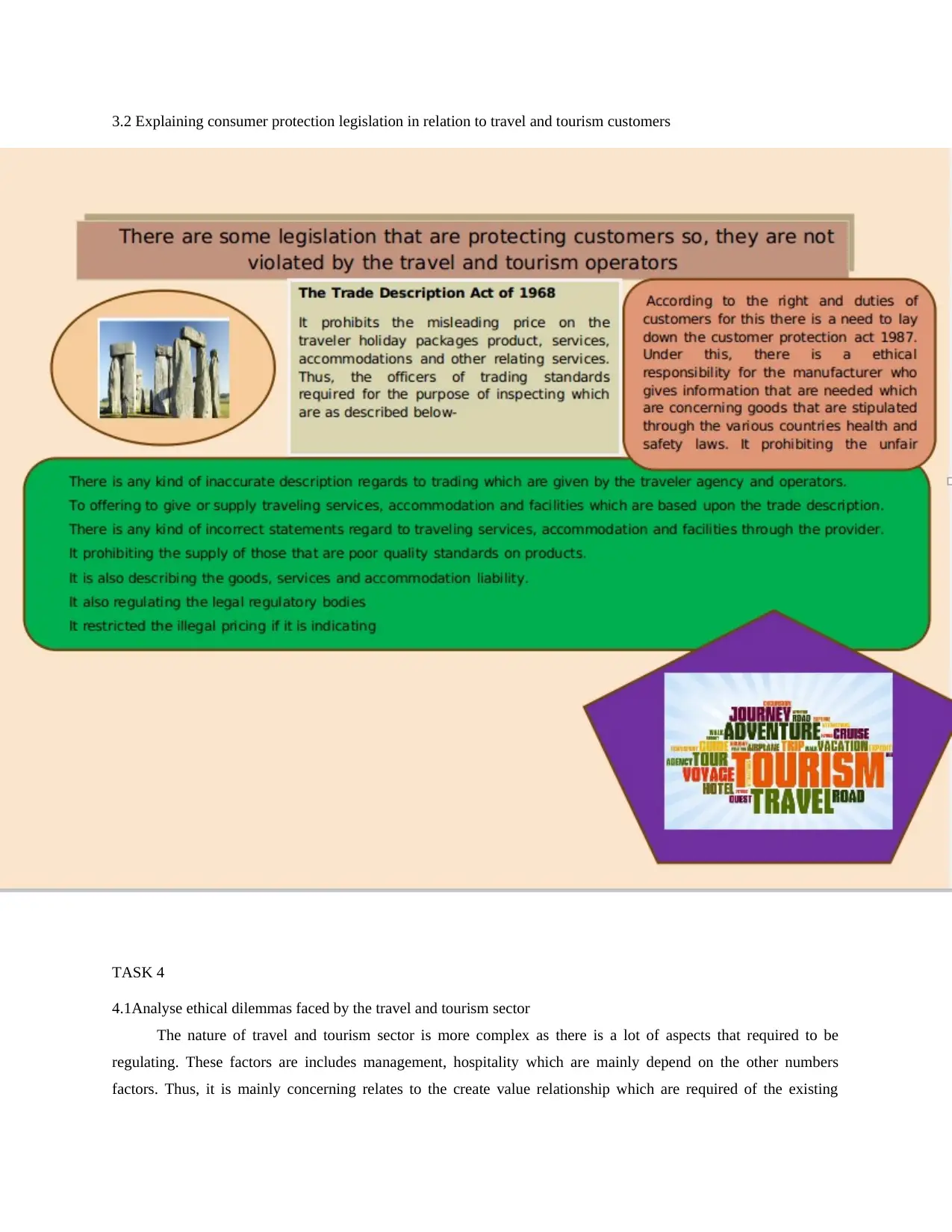
3.2 Explaining consumer protection legislation in relation to travel and tourism customers
TASK 4
4.1Analyse ethical dilemmas faced by the travel and tourism sector
The nature of travel and tourism sector is more complex as there is a lot of aspects that required to be
regulating. These factors are includes management, hospitality which are mainly depend on the other numbers
factors. Thus, it is mainly concerning relates to the create value relationship which are required of the existing
TASK 4
4.1Analyse ethical dilemmas faced by the travel and tourism sector
The nature of travel and tourism sector is more complex as there is a lot of aspects that required to be
regulating. These factors are includes management, hospitality which are mainly depend on the other numbers
factors. Thus, it is mainly concerning relates to the create value relationship which are required of the existing
⊘ This is a preview!⊘
Do you want full access?
Subscribe today to unlock all pages.

Trusted by 1+ million students worldwide
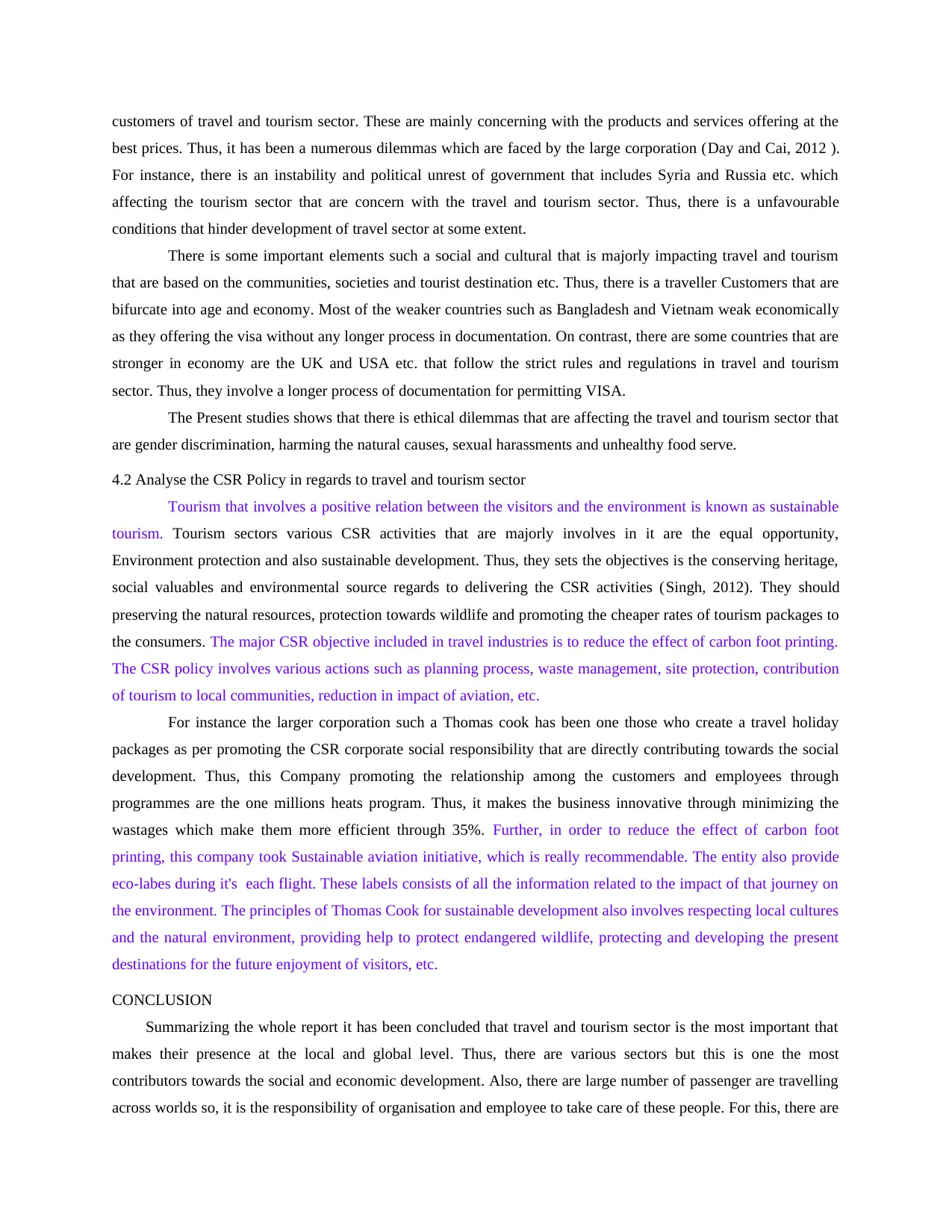
customers of travel and tourism sector. These are mainly concerning with the products and services offering at the
best prices. Thus, it has been a numerous dilemmas which are faced by the large corporation (Day and Cai, 2012 ).
For instance, there is an instability and political unrest of government that includes Syria and Russia etc. which
affecting the tourism sector that are concern with the travel and tourism sector. Thus, there is a unfavourable
conditions that hinder development of travel sector at some extent.
There is some important elements such a social and cultural that is majorly impacting travel and tourism
that are based on the communities, societies and tourist destination etc. Thus, there is a traveller Customers that are
bifurcate into age and economy. Most of the weaker countries such as Bangladesh and Vietnam weak economically
as they offering the visa without any longer process in documentation. On contrast, there are some countries that are
stronger in economy are the UK and USA etc. that follow the strict rules and regulations in travel and tourism
sector. Thus, they involve a longer process of documentation for permitting VISA.
The Present studies shows that there is ethical dilemmas that are affecting the travel and tourism sector that
are gender discrimination, harming the natural causes, sexual harassments and unhealthy food serve.
4.2 Analyse the CSR Policy in regards to travel and tourism sector
Tourism that involves a positive relation between the visitors and the environment is known as sustainable
tourism. Tourism sectors various CSR activities that are majorly involves in it are the equal opportunity,
Environment protection and also sustainable development. Thus, they sets the objectives is the conserving heritage,
social valuables and environmental source regards to delivering the CSR activities (Singh, 2012). They should
preserving the natural resources, protection towards wildlife and promoting the cheaper rates of tourism packages to
the consumers. The major CSR objective included in travel industries is to reduce the effect of carbon foot printing.
The CSR policy involves various actions such as planning process, waste management, site protection, contribution
of tourism to local communities, reduction in impact of aviation, etc.
For instance the larger corporation such a Thomas cook has been one those who create a travel holiday
packages as per promoting the CSR corporate social responsibility that are directly contributing towards the social
development. Thus, this Company promoting the relationship among the customers and employees through
programmes are the one millions heats program. Thus, it makes the business innovative through minimizing the
wastages which make them more efficient through 35%. Further, in order to reduce the effect of carbon foot
printing, this company took Sustainable aviation initiative, which is really recommendable. The entity also provide
eco-labes during it's each flight. These labels consists of all the information related to the impact of that journey on
the environment. The principles of Thomas Cook for sustainable development also involves respecting local cultures
and the natural environment, providing help to protect endangered wildlife, protecting and developing the present
destinations for the future enjoyment of visitors, etc.
CONCLUSION
Summarizing the whole report it has been concluded that travel and tourism sector is the most important that
makes their presence at the local and global level. Thus, there are various sectors but this is one the most
contributors towards the social and economic development. Also, there are large number of passenger are travelling
across worlds so, it is the responsibility of organisation and employee to take care of these people. For this, there are
best prices. Thus, it has been a numerous dilemmas which are faced by the large corporation (Day and Cai, 2012 ).
For instance, there is an instability and political unrest of government that includes Syria and Russia etc. which
affecting the tourism sector that are concern with the travel and tourism sector. Thus, there is a unfavourable
conditions that hinder development of travel sector at some extent.
There is some important elements such a social and cultural that is majorly impacting travel and tourism
that are based on the communities, societies and tourist destination etc. Thus, there is a traveller Customers that are
bifurcate into age and economy. Most of the weaker countries such as Bangladesh and Vietnam weak economically
as they offering the visa without any longer process in documentation. On contrast, there are some countries that are
stronger in economy are the UK and USA etc. that follow the strict rules and regulations in travel and tourism
sector. Thus, they involve a longer process of documentation for permitting VISA.
The Present studies shows that there is ethical dilemmas that are affecting the travel and tourism sector that
are gender discrimination, harming the natural causes, sexual harassments and unhealthy food serve.
4.2 Analyse the CSR Policy in regards to travel and tourism sector
Tourism that involves a positive relation between the visitors and the environment is known as sustainable
tourism. Tourism sectors various CSR activities that are majorly involves in it are the equal opportunity,
Environment protection and also sustainable development. Thus, they sets the objectives is the conserving heritage,
social valuables and environmental source regards to delivering the CSR activities (Singh, 2012). They should
preserving the natural resources, protection towards wildlife and promoting the cheaper rates of tourism packages to
the consumers. The major CSR objective included in travel industries is to reduce the effect of carbon foot printing.
The CSR policy involves various actions such as planning process, waste management, site protection, contribution
of tourism to local communities, reduction in impact of aviation, etc.
For instance the larger corporation such a Thomas cook has been one those who create a travel holiday
packages as per promoting the CSR corporate social responsibility that are directly contributing towards the social
development. Thus, this Company promoting the relationship among the customers and employees through
programmes are the one millions heats program. Thus, it makes the business innovative through minimizing the
wastages which make them more efficient through 35%. Further, in order to reduce the effect of carbon foot
printing, this company took Sustainable aviation initiative, which is really recommendable. The entity also provide
eco-labes during it's each flight. These labels consists of all the information related to the impact of that journey on
the environment. The principles of Thomas Cook for sustainable development also involves respecting local cultures
and the natural environment, providing help to protect endangered wildlife, protecting and developing the present
destinations for the future enjoyment of visitors, etc.
CONCLUSION
Summarizing the whole report it has been concluded that travel and tourism sector is the most important that
makes their presence at the local and global level. Thus, there are various sectors but this is one the most
contributors towards the social and economic development. Also, there are large number of passenger are travelling
across worlds so, it is the responsibility of organisation and employee to take care of these people. For this, there are
Paraphrase This Document
Need a fresh take? Get an instant paraphrase of this document with our AI Paraphraser
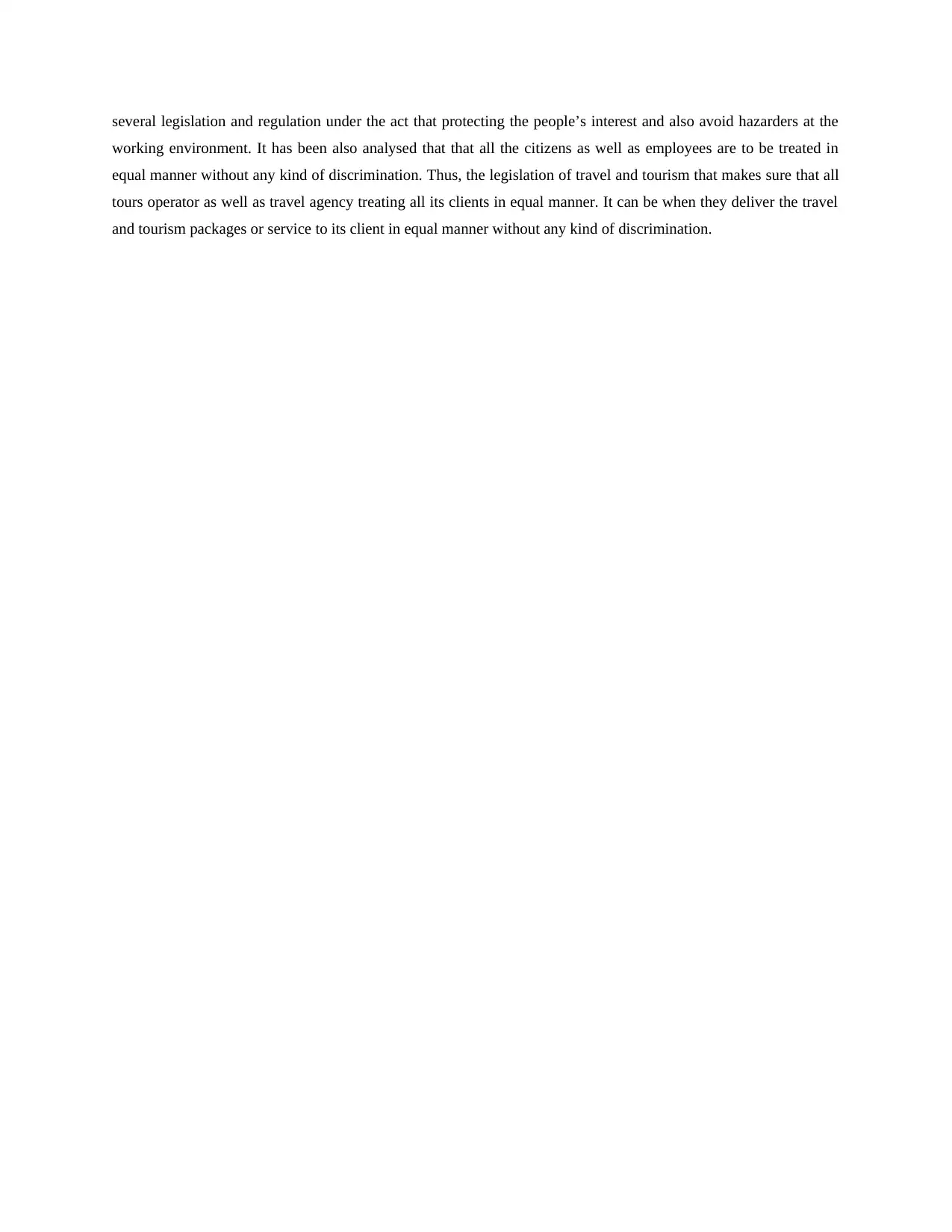
several legislation and regulation under the act that protecting the people’s interest and also avoid hazarders at the
working environment. It has been also analysed that that all the citizens as well as employees are to be treated in
equal manner without any kind of discrimination. Thus, the legislation of travel and tourism that makes sure that all
tours operator as well as travel agency treating all its clients in equal manner. It can be when they deliver the travel
and tourism packages or service to its client in equal manner without any kind of discrimination.
working environment. It has been also analysed that that all the citizens as well as employees are to be treated in
equal manner without any kind of discrimination. Thus, the legislation of travel and tourism that makes sure that all
tours operator as well as travel agency treating all its clients in equal manner. It can be when they deliver the travel
and tourism packages or service to its client in equal manner without any kind of discrimination.
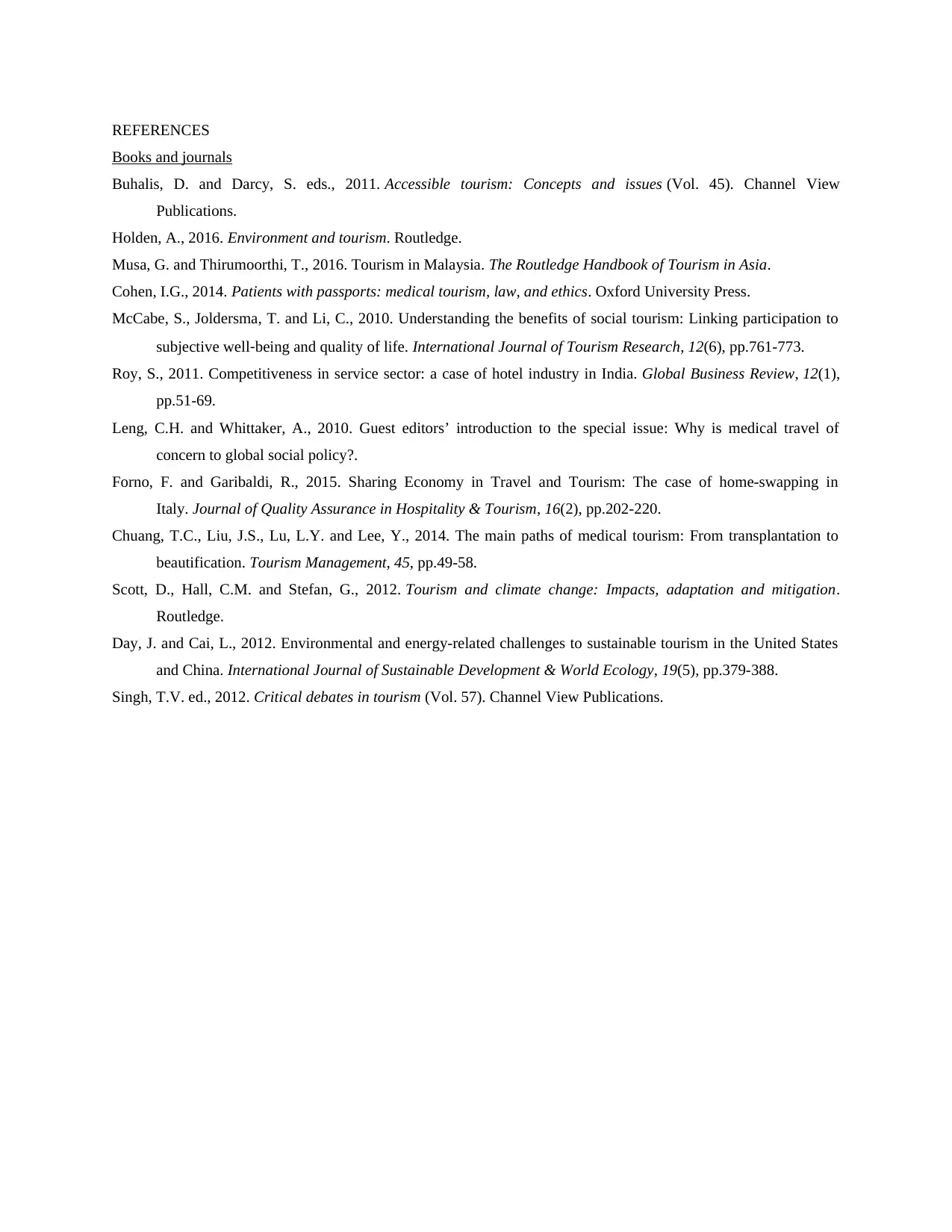
REFERENCES
Books and journals
Buhalis, D. and Darcy, S. eds., 2011. Accessible tourism: Concepts and issues (Vol. 45). Channel View
Publications.
Holden, A., 2016. Environment and tourism. Routledge.
Musa, G. and Thirumoorthi, T., 2016. Tourism in Malaysia. The Routledge Handbook of Tourism in Asia.
Cohen, I.G., 2014. Patients with passports: medical tourism, law, and ethics. Oxford University Press.
McCabe, S., Joldersma, T. and Li, C., 2010. Understanding the benefits of social tourism: Linking participation to
subjective well‐being and quality of life. International Journal of Tourism Research, 12(6), pp.761-773.
Roy, S., 2011. Competitiveness in service sector: a case of hotel industry in India. Global Business Review, 12(1),
pp.51-69.
Leng, C.H. and Whittaker, A., 2010. Guest editors’ introduction to the special issue: Why is medical travel of
concern to global social policy?.
Forno, F. and Garibaldi, R., 2015. Sharing Economy in Travel and Tourism: The case of home-swapping in
Italy. Journal of Quality Assurance in Hospitality & Tourism, 16(2), pp.202-220.
Chuang, T.C., Liu, J.S., Lu, L.Y. and Lee, Y., 2014. The main paths of medical tourism: From transplantation to
beautification. Tourism Management, 45, pp.49-58.
Scott, D., Hall, C.M. and Stefan, G., 2012. Tourism and climate change: Impacts, adaptation and mitigation.
Routledge.
Day, J. and Cai, L., 2012. Environmental and energy-related challenges to sustainable tourism in the United States
and China. International Journal of Sustainable Development & World Ecology, 19(5), pp.379-388.
Singh, T.V. ed., 2012. Critical debates in tourism (Vol. 57). Channel View Publications.
Books and journals
Buhalis, D. and Darcy, S. eds., 2011. Accessible tourism: Concepts and issues (Vol. 45). Channel View
Publications.
Holden, A., 2016. Environment and tourism. Routledge.
Musa, G. and Thirumoorthi, T., 2016. Tourism in Malaysia. The Routledge Handbook of Tourism in Asia.
Cohen, I.G., 2014. Patients with passports: medical tourism, law, and ethics. Oxford University Press.
McCabe, S., Joldersma, T. and Li, C., 2010. Understanding the benefits of social tourism: Linking participation to
subjective well‐being and quality of life. International Journal of Tourism Research, 12(6), pp.761-773.
Roy, S., 2011. Competitiveness in service sector: a case of hotel industry in India. Global Business Review, 12(1),
pp.51-69.
Leng, C.H. and Whittaker, A., 2010. Guest editors’ introduction to the special issue: Why is medical travel of
concern to global social policy?.
Forno, F. and Garibaldi, R., 2015. Sharing Economy in Travel and Tourism: The case of home-swapping in
Italy. Journal of Quality Assurance in Hospitality & Tourism, 16(2), pp.202-220.
Chuang, T.C., Liu, J.S., Lu, L.Y. and Lee, Y., 2014. The main paths of medical tourism: From transplantation to
beautification. Tourism Management, 45, pp.49-58.
Scott, D., Hall, C.M. and Stefan, G., 2012. Tourism and climate change: Impacts, adaptation and mitigation.
Routledge.
Day, J. and Cai, L., 2012. Environmental and energy-related challenges to sustainable tourism in the United States
and China. International Journal of Sustainable Development & World Ecology, 19(5), pp.379-388.
Singh, T.V. ed., 2012. Critical debates in tourism (Vol. 57). Channel View Publications.
⊘ This is a preview!⊘
Do you want full access?
Subscribe today to unlock all pages.

Trusted by 1+ million students worldwide
1 out of 9
Related Documents
Your All-in-One AI-Powered Toolkit for Academic Success.
+13062052269
info@desklib.com
Available 24*7 on WhatsApp / Email
![[object Object]](/_next/static/media/star-bottom.7253800d.svg)
Unlock your academic potential
Copyright © 2020–2026 A2Z Services. All Rights Reserved. Developed and managed by ZUCOL.




